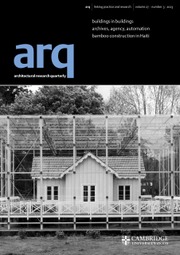No CrossRef data available.
Article contents
Co-producing affordable housing futures: tools for community participation
Published online by Cambridge University Press: 29 February 2024
Extract
Archio interviewed by Dhruv Sookhoo and Ava Lynam
Kyle Buchanan and Mellis Haward, directors of architectural practice Archio, reflect on their experience developing a toolkit of practices that facilitate co-design of community-led housing.
In this interview, Buchanan and Haward examine the participatory approaches that Archio adopts to negotiate the delivery of enhanced housing outcomes [1]. They describe building trust with residents by interpreting their lived experiences and aspirations through architectural knowledge and practices. Discussion focuses on the co-production of design artefacts as tools that enable community stakeholders to negotiate shared ambitions for their neighbourhood within community-based development and regulatory processes (e.g. development management).
In 2016, Archio was invited by London Community Land Trust and Citizens UK to compete for the opportunity to design and deliver eleven affordable homes on a disused garage site at Brasted Close, in Lewisham, London [2]. Unusually, a “Pick an Architect” workshop was held on the development site, where the public was able to evaluate prospective architectural teams for their ability to engage future residents and neighbouring communities in the collective examination of fundamental socio-spatial aspects of the project. Archio’s successful approach at the pioneering community land trust at Brasted Close anticipated their development of a toolkit of practices that emphasise collaboration during community-led development of affordable housing. These design tools were refine through use across a series of later commissions including a co-housing project at Angel Yard, Norwich and a resident-led estate regeneration scheme at Astley Estate, Southwark.
- Type
- Insight
- Information
- Creative Commons
- This is an Open Access article, distributed under the terms of the Creative Commons Attribution licence (http://creativecommons.org/licenses/by/4.0/), which permits unrestricted re-use, distribution and reproduction, provided the original article is properly cited.
- Copyright
- © The Author(s), 2024. Published by Cambridge University Press


